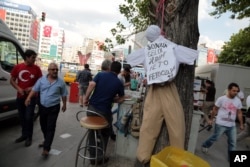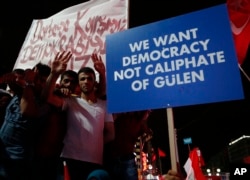If Turkish President Recep Tayyip Erdogan is hoping the U.S. will quickly spirit his archnemesis Fethullah Gulen out of rural Pennsylvania to stand trial in Turkey for plotting last week's failed coup against his government, he'll be sorely disappointed.
Erdogan has accused Gulen, a Turkish cleric and former political ally with whom he had a falling out in 2013, of engineering Friday's coup attempt from his self-imposed exile in Saylorsburg, Pennsylvania, and trying to have Erdogan assassinated as part of the plot.
Turkish Prime Minister Binali Yildirim said Tuesday that Turkey had given evidence of Gulen's involvement to the U.S. government after U.S. Secretary of State John Kerry said that Washington wanted hard evidence, not allegations.
But even if the U.S. agrees there is enough evidence to extradite Gulen, the extradition process could take months, if not years — roiling already strained relations between the two long-time NATO allies at a time they're waging a military campaign against the Islamic State in neighboring Syria and Iraq.
"I think what it will really do is to poison the overall atmosphere of the relationship even more than it already has been, and lead to anti-American sentiments about what they'd call in Turkey 'support for terrorism,'" said Aaron Stein, a senior resident fellow at the Atlantic Council who has closely monitored the situation in Turkey.
1979 treaty
Gulen's extradition request will be adjudicated under a 1979 treaty between the U.S. and Turkey, one of more than 100 the U.S. has signed with other countries.
Among other requirements, the treaty spells out the content of the formal request and the channel through which it is communicated. In the case of Gulen — someone who has been accused of a crime but not convicted — it calls for an arrest warrant; a statement of facts of the case; evidence that the offense, though allegedly committed in Turkey, is prosecutable in the U.S.; and the text of the law under which the accused would be tried.
It remains unclear what documents Turkey has turned over to Washington. But it doesn't appear to be a "provisional arrest or detention" warrant, which would require the U.S. to arrest and detain Gulen for up to 60 days to give Turkey time to prepare a formal extradition request and to keep him in custody until a decision is handed down in his extradition case.
Regardless, once the U.S. Department of State and the Department of Justice formally receive the request and determine that it meets all treaty standards, it moves to the U.S. District Court for the Middle District of Pennsylvania, where Gulen has lived as a permanent resident since 1999, according to two international extradition experts who spoke to VOA.
In the U.S. district court, the case will likely be assigned to a magistrate judge, a relatively low-level member of the U.S. judiciary, with the government of Turkey effectively represented by an Assistant U.S. Attorney and Gulen defended by his own lawyers, said Douglas McNabb, an international criminal lawyer who has handled over three dozen extradition cases. This leg of the process alone could potentially take months.
If the magistrate judge turns down the extradition request, Gulen would be set free and allowed to remain in the U.S. If, on the other hand, the judge approves it, Gulen's legal team could attempt to block his immediate deportation by appealing the decision in the U.S. federal court system.
Though extradition cases are almost never taken up by the U.S. Supreme Court, McNabb said Gulen's defense team could petition the court to consider the case. Whatever the final court verdict, the extradition would ultimately be decided by the secretary of state.
Political offense exception
The U.S.-Turkey extradition treaty lists 34 categories of "extraditable offenses," crimes ranging from bribery to arson to murder that are prosecutable in both countries and punishable by more than a year in prison. But it also allows for a "political offense exception," a legal concept under which extradition would not be granted if the alleged crime is "political in nature."
The way McNabb reads that language, an "offense committed or attempted against a Head of State or Head of Government" means a plot solely aimed at taking out a foreign leader.
"That's not what occurred here," McNabb said. "What occurred here was an uprising against the government and as part of that, there is an allegation that he tried to have him [Erdogan] assassinated."
The 75-year-old Gulen has dismissed Turkish accusations of leading the coup, which left more than 290 dead and more than 1,400 others wounded, telling Reuters that he'd personally "suffered under multiple coups" in Turkey. He moved to the U.S. after a 1997 soft coup — the fourth military pustch in Turkish history — overthrew the country's then-Islamist leaning government, leading to a period of turmoil in the country.
WATCH: Muslim Cleric Gulen Denies Involvement in Uprising
Gulen signaled Tuesday that he'd likely mount a "political offense exception" defense, calling on the Obama administration to "reject any effort to abuse the extradition process to carry out political vendettas."
"It is ridiculous, irresponsible and false to suggest I had anything to do with the horrific failed coup," Gulen said in a statement.
"The Turks need to be very careful if they're going to seek his extradition that they don't make out a case for the ‘political offense exception’ and, therefore, the U.S. doesn't extradite him," McNabb said.
Letting the courts handle it
A Turkish government crackdown on suspected Gulen sympathizers following the coup attempt has stoked Western fears that Erdogan may use the episode to silence critics and consolidate his power over a deeply polarized country. And concern over the Erdogan government's disdain for rule of law could lead the U.S. to dismiss evidence against Gulen as "tainted," and to reject the extradition request.
But, said James Jeffrey, a former U.S. ambassador to Turkey and a distinguished fellow at the Washington Institute for Near East Policy, Washington should not be quick to turn down the request.
"Regardless of the justification, it would be disastrous, I think, if the administration said, 'Ah, this isn't a good enough case; we're not going to let the courts adjudicate it. We're just going to turn it down,'" Jeffrey told an audience Wednesday at the Washington Institute for Near East policy.
Making use of the U.S. court system would help cool tensions with Turkey, Jeffrey said, noting how German Chancellor Angela Merkel defused a crisis in Turkey earlier this year with her decision to allow the prosecution of a German comedian who had drawn threats of a defamation lawsuit from Erdogan over an obscene poem.
Even before Friday's coup attempt, Turkey had asked the U.S. to arrest and extradite Gulen, whom it had designated a terrorist. However, Turkey had never made a formal extradition request. While the U.S. studies the latest Turkey request, analysts in Turkey and the U.S. say Turkey may be blustering, preferring the threat of an extradition to the actual thing.
"What I think is going on is that, for political populist reasons, [Gulen] is far more valuable in the United States under the threat of extradition than he is in Turkey, where he'd be allowed to speak in a trial and be cross examined … where he could reveal potentially damaging things about the government," said Stein of the Atlantic Council.









